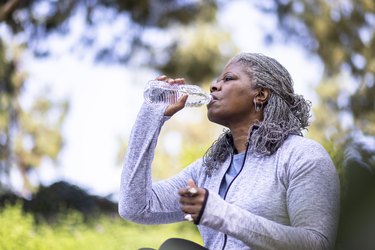- Empty cart.
- Continue Shopping
The Role of Electrolytes in Physical Performance

Electrolytes are essential minerals that play a pivotal role in maintaining various bodily functions, especially during physical activities. Whether you’re an elite athlete or a casual exerciser, understanding the significance of electrolytes in physical performance is crucial for optimizing your workouts and ensuring overall health.
What Are Electrolytes?
Electrolytes are electrically charged minerals that are dissolved in bodily fluids, primarily in the form of ions. These minerals include sodium (Na+), potassium (K+), calcium (Ca2+), magnesium (Mg2+), chloride (Cl-), phosphate (HPO4²-), and bicarbonate (HCO3-). Electrolytes are found in various body fluids, such as blood, sweat, and urine, and are essential for maintaining the body’s overall balance and function.
The Role of Electrolytes in Physical Performance
1. Maintaining Fluid Balance
One of the primary functions of electrolytes is to regulate fluid balance within the body. Sodium and potassium, in particular, play crucial roles in this process. During physical activity, the body sweats to cool down, and this results in the loss of fluids and electrolytes. Maintaining the right balance of these minerals is essential to prevent dehydration, which can negatively impact physical performance.
2. Muscle Function
Electrolytes are essential for proper muscle function. Calcium, sodium, and potassium ions are responsible for muscle contractions. When you engage in physical activities like running or weightlifting, your muscles rely on these ions to contract and relax. An imbalance of electrolytes can lead to muscle cramps, weakness, or even severe conditions like rhabdomyolysis, which is characterized by muscle breakdown.
3. Nerve Function
In addition to muscle function, electrolytes are crucial for nerve function. Nerve cells, also known as neurons, transmit electrical signals throughout the body to coordinate movements and sensations. Sodium and potassium ions are critical for these electrical impulses. An imbalance can lead to nerve dysfunction, causing issues like tingling sensations, numbness, or muscle spasms.
4. Temperature Regulation
During physical exertion, your body temperature rises, and sweating is the primary mechanism for cooling down. Electrolytes, particularly sodium, help regulate body temperature. Sweating results in the loss of sodium, so maintaining an adequate sodium level is essential to prevent overheating during exercise.
Sources of Electrolytes
Now that we understand the importance of electrolytes in physical performance, let’s explore where you can obtain these vital minerals.
1. Food Sources
You can obtain electrolytes from various food sources, which is essential for maintaining a balanced diet. Here are some examples:
- Sodium: Found in table salt (sodium chloride), processed foods, and some vegetables.
- Potassium: Abundant in fruits (bananas, oranges, and avocados), vegetables (potatoes and spinach), and legumes.
- Calcium: Dairy products like milk, cheese, and yogurt are excellent sources of calcium.
- Magnesium: Nuts, seeds, whole grains, and leafy green vegetables are rich in magnesium.
- Chloride: Present in table salt and many processed foods.
- Phosphate: Found in meat, fish, dairy products, and some plant-based foods.
- Bicarbonate: The body can naturally produce bicarbonate, but it can also be obtained from certain foods like fruits and vegetables.
2. Electrolyte Supplements
For individuals who engage in intense physical activities or sweat heavily, electrolyte supplements can be beneficial. These supplements come in various forms, including tablets, powders, and drinks, and are designed to quickly replenish lost electrolytes during exercise. However, it’s important to consult a healthcare professional before incorporating supplements into your routine, as excessive intake can have adverse effects.
3. Hydration
Proper hydration is essential for maintaining electrolyte balance. Water is the primary component of bodily fluids, and when you’re well-hydrated, it helps distribute electrolytes throughout your body effectively. Monitoring your fluid intake and drinking water regularly, especially during workouts, is crucial for preventing dehydration and imbalances.
Maintaining Electrolyte Balance
Now that we know where to obtain electrolytes, it’s equally important to understand how to maintain the right balance of these minerals.
1. Stay Hydrated
As mentioned earlier, adequate hydration is key to maintaining electrolyte balance. Drink water regularly throughout the day, and increase your intake when engaging in physical activities. It’s important to listen to your body and drink when you’re thirsty.
2. Balanced Diet
A well-balanced diet that includes a variety of foods can help ensure you get the necessary electrolytes. Incorporate fruits, vegetables, lean proteins, and whole grains into your meals to provide your body with the minerals it needs.
3. Monitor Sodium Intake
While sodium is essential, excessive consumption can lead to health problems such as high blood pressure. Be mindful of your sodium intake, especially if you consume a lot of processed foods, and try to limit your salt intake when possible.
4. Consider Electrolyte Supplements
If you engage in prolonged or intense physical activities, consider using electrolyte supplements. These can help you maintain electrolyte balance, especially in situations where you’re losing a significant amount of sweat.
5. Pay Attention to Individual Needs
Everyone’s electrolyte needs are different, and factors like climate, exercise intensity, and individual sweat rates can affect your requirements. Pay attention to how your body responds to exercise and adjust your electrolyte intake accordingly.
In Conclusion, Electrolytes are unsung heroes when it comes to physical performance. These essential minerals play vital roles in maintaining fluid balance, muscle and nerve function, and temperature regulation. To optimize your physical performance and overall health, it’s crucial to ensure you’re getting an adequate supply of electrolytes through a balanced diet, hydration, and, if necessary, supplements. By understanding the role of electrolytes and taking proactive steps to maintain their balance, you can unlock your full potential and achieve your fitness goals. Remember that individual needs may vary, so consult with a healthcare professional or registered dietitian for personalized guidance on your electrolyte requirements.








